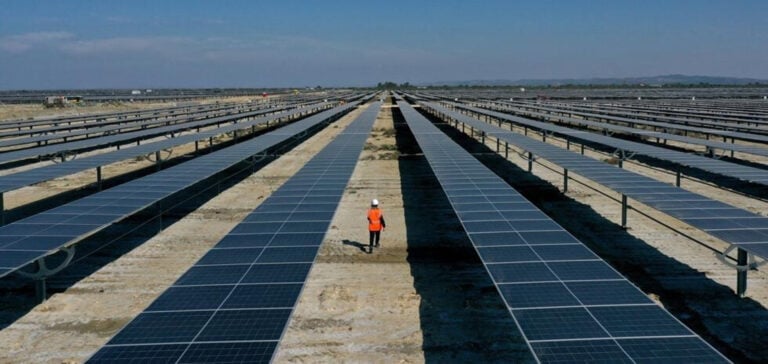A Step Towards Green Energy
In 2022, an official study warned of the state of the dams – and new dam projects were cancelled, challenged by environmental NGOs. Karavasta’s thousands of hours of annual sunshine should ensure stable production.
As of this winter, explains Constantin von Alvensleben, Voltalia’s country manager for Albania, “100% of the energy produced by the Karavasta solar power plant will be sold to the Albanian national utility, which will in turn distribute it via the Albanian distribution company OSHEE. If Albania generates a surplus of electrical energy, it will be able to export the electricity to users in neighboring countries such as Greece, Italy, Kosovo, Montenegro or Northern Macedonia”.
Although its electricity is 100% green, Albania also produces some 650,000 tonnes of crude oil every year, much of which is exported to the European Union under conditions denounced by many environmental organizations.
Salty Soils for an Energy Revolution
The Karavsta power plant is located on salty, uncultivable land – a rarity in Europe, explains Luca Anthouard, engineer on the project, which has enabled this plant to be “on a grand scale by European standards”. And this soil is well suited to the panels installed here, “which we call bi-facial because they capture energy from the sun’s direct rays as well as the diffuse radiation from the ground’s reverberation”, he adds.
The cracked earth used to be home to small green frogs – Pelophylax shqipericus, or Albanian Frogs. “A protected species,” explains Vilma Terpollari, Voltalia’s environmental consultant. To this end, she explains, “we have drawn up specific projects to protect this species and create new habitats so that it can return and reproduce here”. On the prefabs dotted around the plant, photos of this little frog with a fluorescent green line across its back urge workers to be careful.
Impact on local wildlife
Higher up, it’s the line that carries electricity from the power station to the redistribution station that could disturb the birds. The nearby nature reserve is home to curly pelicans and pink flamingos, and the region is on the migration map for many species. “Voltalia has installed bird diverters,” points out Ms Terpollari, “a first in Albania”. These towers signal the birds to make a detour.
As for the inhabitants of the surrounding villages, 53 families had to leave their homes to make way for the construction of the power plant. Voltalia’s social advisor Ramatlen Bollobani explains that they will be reimbursed by the state, in accordance with the law”. The company has undertaken to add money “to reach the market value of their property, including agricultural production”. Only one family is contesting its eviction.
Final analysis
The Karavasta power plant represents a major energy and environmental turning point for Albania. It will not only guarantee a stable electricity supply, but also reduce dependence on hydroelectric power plants and oil imports. In addition, efforts to preserve local wildlife demonstrate the company’s commitment to biodiversity.
In conclusion, the Karavasta solar power plant embodies Albania’s future in clean, renewable energy. Its positive impact on the environment and the country’s electricity supply makes it an essential project. Albania is thus opening up to green energy opportunities, while taking steps to protect its precious natural resources.






















